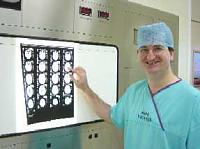Co-designing good practice guidelines for chronic subdural haematoma
Background
A chronic subdural haematoma (cSDH) is a collection of old blood that forms between the skull and the brain. It can cause symptoms including weakness, confusion, or seizures. It normally affects older people, especially those who have other medical conditions or are frail.
Surgery can be a good treatment for cSDH, but not all patients will be suitable for surgery because of other conditions. Those undergoing surgery are most likely to benefit if they have access to high quality care before and after their operation, including support for rehabilitation.
Surgical care for cSDH is provided in specialist neuroscience units, but in most cases patients are diagnosed in other hospitals before being transferred to and from these specialist centres. At the moment, there is no consensus on “what good looks like” across these complex pathways, which are often fragmented.
Efforts to improve the perioperative care (the care provided through diagnosis, surgery, and recovery) of patients with cSDH therefore needs the expertise of professionals from a variety of healthcare settings and to be guided by the needs, priorities, and preferences of patients and carers.
The Improving Care in Elderly Neurosurgery Initiative (ICENI) was formed in 2021. It includes representatives from a broad range of professionals caring for patients with cSDH as well as patient advocates. ICENI is developing the first comprehensive clinical practice guideline to guide the care of patients with cSDH, taking into account learning about the benefits of integrated working that have revolutionised the care of other groups of surgical patients.
ICENI has created a set of draft recommendations covering care from the point of diagnosis, through the surgical period, including the management of medication and other health conditions, as well as rehabilitation. A consensus-building exercise is underway to decide how to enhance and prioritise these recommendations.
Approach
We’re asking healthcare professionals to help in reaching agreement on which draft recommendations should be included in the final guideline, and we’re consulting with patient groups to ensure their perspectives are fully represented.
A modified Delphi study involves two online questionnaires for healthcare professionals. Hosted on Thiscovery, the study asks participants their views on whether a series of draft recommendations should be included, rephrased, or excluded from the guideline.
The results of the two questionnaires will help to prioritise recommendations for inclusion. The findings will then directly inform discussions at a ratifying meeting of the ICENI committee and patient representatives later this year.
When we have consensus on which statements should be included in the guideline, we’ll submit our findings to for consideration of endorsement.
We’ll carry out a separate survey to get the views of professionals, managers, and other organisations on how to optimise implementation of the guideline, again with patient perspectives to the fore.



Funding and ethics
This project is funded by the Association of Anaesthetists/Anaesthesia via the National Institute for Academic Anaesthesia (NIAA) (WKR0-2021-0014) and the Health Foundation’s grant to The Healthcare Improvement Studies Institute (THIS Institute), with early work funded by the Addenbrookes Charitable Trust (ACT) (900268). The study was reviewed by the Psychology Research Ethics Committee, ref: PRE.2023.065.





